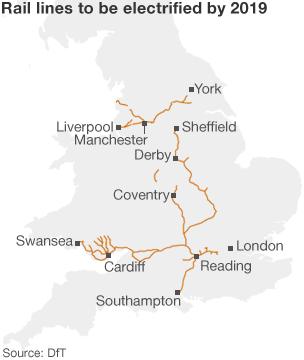£9bn railway investment announced by coalition
- Published
- comments
David Cameron: ''It's about getting people and freight off the roads and onto the railway''
A £9.4bn package of investment in the railways in England and Wales, including £4.2bn of new schemes, has been unveiled by the government.
The plans include electrification of the Midland Main Line between Bedford and Sheffield.
Other rail improvements have been unveiled for the Manchester area, south Wales and East Coast Main Line.
Prime Minister David Cameron called it the "biggest modernisation of our railways since the Victorian era".
During a visit to Birmingham to announce the railway investment, the PM said it would lead to the electrification of an extra 850 miles of track.
He said: "This investment will mean faster journeys, more seats, better access to stations, greater freight links and a truly world-class rail network."
Deputy Prime Minister Nick Clegg, who joined the PM on the visit, said the plans would help "close the north south divide".
It includes £5.2bn for the completion of current schemes, such as Crossrail and Thameslink and £4.2bn for new projects.
These include:
A high-capacity "electric spine" running from Yorkshire and the West Midlands to south coast ports, boosting passenger and freight capacity
An £800m electrification and upgrade from Sheffield to Bedford, completing the full electrification of the Midland Main Line
<link> <caption>Electrification extended from Cardiff to Swansea</caption> <url href="http://www.bbc.co.uk/news/uk-wales-18828866" platform="highweb"/> </link> , costing £600m, plus electrification of the Welsh valley lines
The Northern Hub - a series of projects around Manchester worth £322m that improve northern rail capacity to get more and faster trains across the north of England
Upgrades to the East Coast Main Line from London to Leeds and Newcastle worth £240m to create faster journeys and increase capacity
Upgrades to stations and tracks creating capacity for an additional 140,000 daily rail commutes around cities at peak times, including £350m for lengthening platforms at London's Waterloo station
A new £500m rail link between the Great Western Main Line and Heathrow
Building work on the rail projects will not start until at least 2014, as the announcement covers the period 2014 to 2019.

The government said it would be funded "in part from fare rises already announced in 2010 and also from the substantial efficiency savings which projects like electrification will have on the long-term operating costs of the railways".
In January this year, passengers faced average increases of RPI inflation plus 1% on regulated fares, which are set to rise by RPI plus 3% in January 2013 and 14.
Transport Secretary Justine Greening told BBC Radio 4's Today programme the government had a long-term plan to make the rail industry work more efficiently and stop the above-inflation fare rises.
"We've got to get the money from somewhere so, for the time being, the passengers are paying," she said.
"We all know that diesel is massively expensive so if we can move over to electric trains, not only are they greener, they're also cheaper and also they are lighter too, so what that means is that when they are on the track they don't damage it so much, so maintenance costs go down too," she added.
Regarding access to the rail network, she later told Parliament she was initially making £20m available for Network Rail to invite bids for new stations.
Value for money
Shadow transport secretary Maria Eagle said: "We welcome this investment, it was actually first announced under the last Labour government... but this won't help jobs and growth now, as there's not going to be a penny spent until after 2014."
She refused to rule out renationalising the railways to ensure better value for money.
But Labour played down the significance of her comments, saying the focus would be on local solutions.
Bob Crow, general secretary of transport union the RMT, said: "What we need is investment in rail today not yet another political promise of jam tomorrow."
Chief executive of rail customer watchdog Passenger Focus, Anthony Smith, said passengers would welcome the "scale and ambition" of the investment.
But he added: "Value for money remains a concern. Passengers will want to see the government avoid above-inflation fare increases. These investments must be delivered in a cost-effective way."
Campaign for Better Transport chief executive Stephen Joseph said the investment was good news, but the two years of fare increases would mean many passengers could not afford its benefits.
"At a time when public subsidy of the railways is falling and efficiency savings in the industry are already reducing costs, there is simply no need to make passengers pay over the odds," he said.
Network Rail is funded by a £3.5bn annual government grant and income from track access charges - either rail fares or revenue support payments from the government. It also borrows money which the government guarantees.
- Published16 July 2012
- Published16 July 2012
- Published14 July 2012
- Published13 July 2012